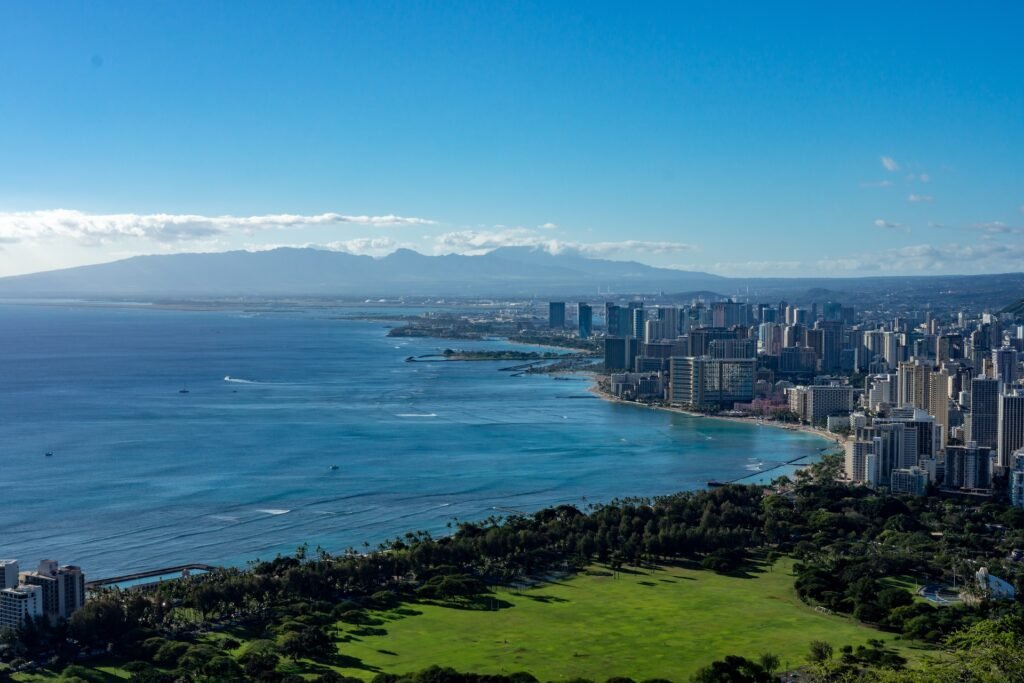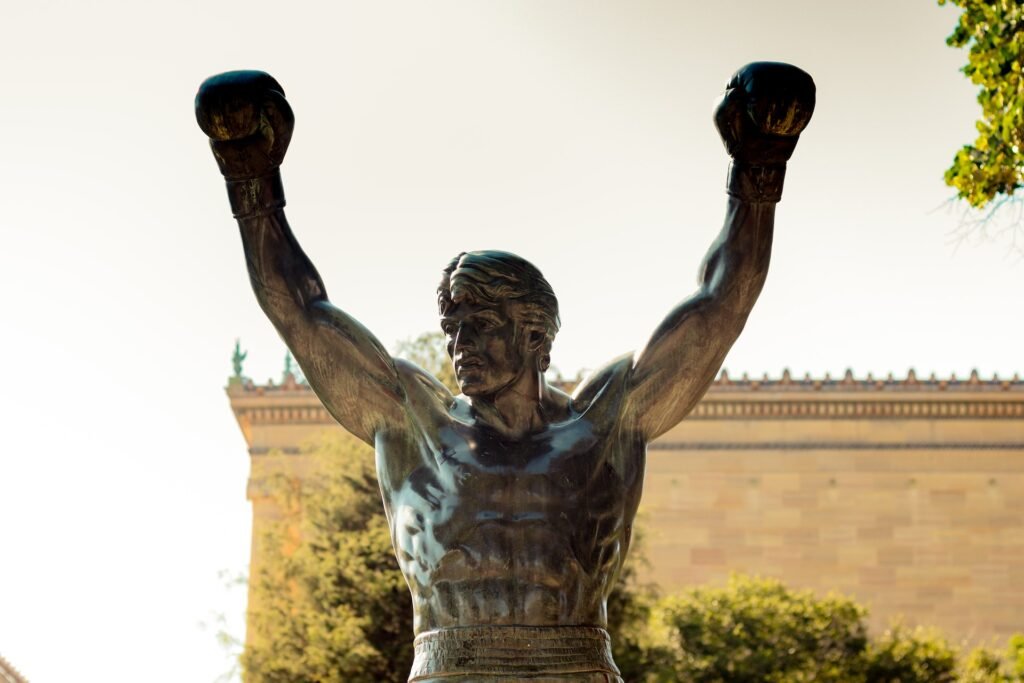Note: This list is based on data from 2022, and there have been some changes since then. Refer to this post for the latest list of the largest marathons in the United States.
I’m sure you’ve got some idea what the largest marathon in the US is. Everyone knows that the New York City Marathon is the biggest of them all.
But how many other large races can you name?
Every year, hundreds of thousands of runners compete in hundreds of races across the country. Some of them are small affairs. But there are many others, besides New York, with thousands of runners lining up to run 26.2 miles.
At one point, I was curious about the ten largest races in the country. I was surprised that I couldn’t find a simple breakdown. A lot of articles listed out ten large marathons – but most of them mixed and matched races from different years. And they often cited a race’s peak year – even if it has since declined in size.
So I gathered the data myself and put together a visualization to answer the question. Specifically, in 2022 what are the 25 largest marathons in the United States?
The List of the Biggest Marathons
The visual above shows the 25 largest races in the country, by finishers, that were run in 2022.
Note that the number of finishers here represents only the number of finishers in the marathon. Many of these races are weekend long events, featuring multiple distances. In some cases, two or three times as many runners may participate in the weekend as a whole.
The Big Three Marathons
The largest race – the New York City Marathon – is far and away the biggest. In 2022, there were 47,743 finishers. In recent years, there have typically been close to 50,000 and it has been the biggest race in the world. It paved the way in the 1970’s for marathons to transition from small, competitive affairs with dozens or hundreds of runners to mass participation events with thousands of participants.
The second largest race – the Chicago Marathon – is bigger than the rest. But it trails New York by a significant amount. The 39,420 finishers in 2022 is actually less than its peak. The field still hadn’t fully recovered from COVID, and it’s typically closer to New York. The modern Chicago Marathon debuted in 1977, and it has been in competition with the NYC Marathon ever since.
The third largest race – the Boston Marathon – is the last of the giants. The 24,607 finishers night seem small when compared to New York, but it’s still 10,000 finishers above the next race on the list. Although Boston may be the most prestigious race on the list, it surprises some that it isn’t the biggest. It is, however, the oldest – dating back to 1897.
Those three races are far and away the largest – and none of the other races came close to breaking the 20,000 finisher mark.

The Other Races with 10,000 Plus Finishers
After Boston, there’s a cluster of races that are still large by any standards – with an excess of 10,000 finishers.
The Honolulu Marathon comes in 4th place, with 14,249 finishers. Unlike the top three races, for which you have to qualify or win a coveted lottery spot, the Honolulu Marathon is open to all. It also has no cut-off time, meaning you can take as long as you want to finish. This lovely destination race started in 1973, and it attracted laid back runners ever since.
Next up is the Los Angeles Marathon with just over 12,000 finishers. This early spring race (March) is another opportunity for the rest of the country to get out of the cold and enjoy nice weather. Like Honolulu, it’s also a laid back affair with more emphasis on participation than finishing time. The LA Marathon launched in 1986, and the next year it had 10,000 runners – more than either Boston or Chicago in that year.
Following LA is the Disney World Marathon with a little over 11,000 finishers. Like Honolulu, this is a popular destination race in a warm climate during the winter months (January). The race is relatively newer (1994), and it consistently draws a large crowd of fans to run through the parks. But be ready to wake up early. This race starts at 5am.
The last of the 10k club is the Marine Corps Marathon with just shy of 11,000 runners in 2022. The race dates to 1975, and it prides itself on being open and accessible to all. It’s nickname is “The People’s Marathon,” because it has no entry criteria and it offers no prize money. The Marine Corps runs the event, so you know it is well organized. And the beautiful course runs through the nations monuments.

Large Marathons with 5,000 to 10,000 Runners
Moving down the list, there are a handful of races in the 5,000 to 10,000 range.
The Philly Marathon is the largest of this group – with just over 8,000 finishers in 2022. This is another relatively new race, dating back to 1994. It quickly grew in size, and it peaked at over 11,000 finishers at one point. It has gotten slightly smaller since then, but it’s still a popular marathon that sits solidly in the top 10. The course takes you through historic Philly before going out and back along the Schuylkill River.
The California International Marathon – or CIM – is next on the list. This race dates to 1983, and it has a reputation for being fast and competitive. In 2022, it was the USATF Marathon Championship race, and it’s often targeted by serious runners trying to notch an Olympic Trials qualifying time. Twenty years ago, the race was a more modest size (~2,000 finishers), but recently it has grown to consistently be in the top 10 largest in the country.
Next up is the Twin Cities Marathon in Minneapolis and St. Paul, Minnesota. Like CIM, it is popular among serious amateur runners, and it has also served as the US Marathon Championship race many times in the last twenty years. The race dates back to 1982, and is part of a long tradition of running in the upper Midwest.
The Houston Marathon also has over 6,000 finishers, but in 2022 it just missed the top 10 list. This January race is another favorite of serious runners, since it offers a flat course and typically good weather. This race was founded in 1972, making it the third oldest (behind Boston and New York) on the list so far.
Grandma’s Marathon in Duluth, Minnesota rounds out this group, with just shy of 6,000 finishers in 2022. Unlike the other races on this list, Grandma’s takes runners outside of the big city. The course runs along the coast of Lake Superior and ends in the small-ish city of Duluth. The organizers describe this as a world class event with small town charm.

Large Marathons with Less Than 5,000 Runners
The remainder of the list is shy of 5,000 runners, but they all have over 2,000 runners.
The first of these is the Indianapolis Monumental Marathon – or Indy Monumental. Compared to the rest of the list, it is a very new race – starting in 2008. It has grown significantly from the original 1,100 finishers. But in recent years, its size has hovered around 4,000 to 5,000 finishers.
Next up is the San Francisco Marathon, with just over 4,000 finishers. It’s a rare summer marathon in July, but with its northern California location you can expect decent weather. No doubt the course running across the Golden Gate Bridge is another one of its selling points.
After that is the St. George Marathon in Utah. This is a net downhill marathon through the Pine Valley Mountains, and it’s known for being both scenic and fast. It’s a great choice for runners looking to eke out a little extra speed for a Boston Qualifying time – aided by the 2,500 feet in elevation loss. In past years, the race has had over 5,000 finishers.
The Richmond Marathon in Virginia comes next. It’s another fast course that’s popular among those seeking to qualify for Boston. It’s also another late November option for people who don’t want to brave the potentially cold weather in Philly.
Big Sur in California also sports a little over 3,000 finishers. The race, along Scenic Highway 1, is often considered one of the most scenic races in the country. There are some serious rolling hills, and it’s a tough course. Choose this one for the view – not for your PR.
The Brooklyn Marathon had just under 3,000 finishers in 2022. This race is organized by NYC Runs – New York Road Runners much smaller cousin. This was something of an outlier, though, as most the full marathon has typically had closer to 500 runners. This is the last year that the organization put on a full marathon, and they seem to have transitioned to focusing on half marathons.
The Austin Marathon is one of the smaller Texas marathons on the list. It’s a February race, so it’s another option if you’re looking for a warm-weather winter race. February isn’t generally a popular month for marathons.
The Pittsburgh Marathon is the smaller of the two Pennsylvania marathons on the list. The race dates to the 1980’s, and it has served as both the Olympic Trials and US National Marathon Championship race. However, the race was suspended from 2004 to 2008 when it lost its sponsor. After returning in 2009, the race has had as many as 5,000 finishers in some years.
The Cincinnati Flying Pig Marathon comes next with just over 2,500 finishers. If you’re on a 50 state marathon quest, this race is special. It will help you check off both Ohio and Kentucky.
The Dallas Marathon is the other smaller Texas race, with just under 2,500 finishers. The races dates back to 1971, making it one of the oldest races on the list.
The Miami Marathon is the smaller of the two Florida races on the list. Without the appeal of the Disney parks, it must be hard to convince people to run a marathon in Florida. The race is in late January, so the weather is about as good as it gets … but that doesn’t mean it’ll be good.
The Columbus Marathon is the other Ohio race on the list. Although it had slightly less than 2,500 finishers in 2022, the race has had up over 5,000 finishers in some previous years. Buckeye fans will be excited about the opportunity to run through the Horseshoe.
Rounding out the list is the Portland Marathon in Oregon with about 2,300 finishers. In its heyday, this was one of the top 10 biggest races in the country. In 2009, it peaked at over 8,000 finishers. It declined from there, though, and there was it was cancelled after 2017 in the wake of a financial scandal. The race returned, but it’s never quite gotten back to where it was.
Which Marathon Do You Want to Run?
This list includes a lot of races that are on my bucket list.
I’ve run Philly, and I loved it. I’m registered to run Chicago in October 2024, and I hope to run New York City and Boston in the next few years. I love DC, so I’ve always wanted to run the Marine Corps Marathon. Beyond that, Twin Cities and Columbus are on my to do list because I have family in those cities, and I’d love to enjoy the views of Big Sur.
What about you – which of these races is on your bucket list? There are a lot of great choices, spread around the country and at many different times of year. Whether you’re looking to run fast or take it slow, one of these races is perfect for you.
